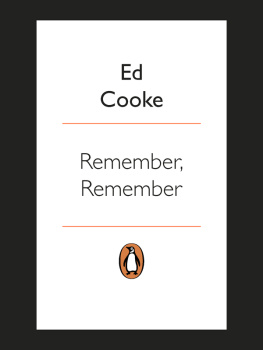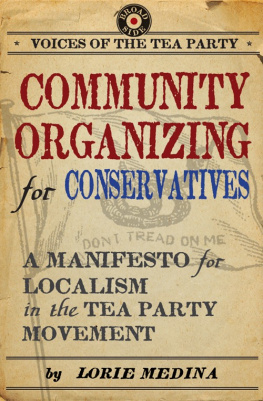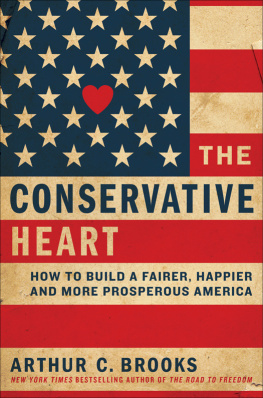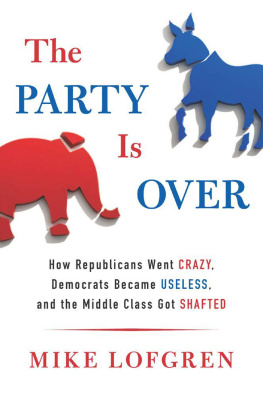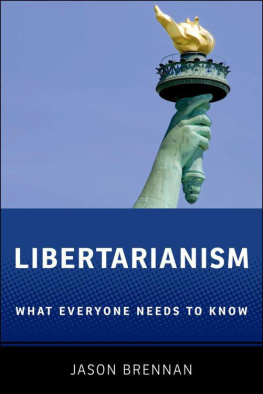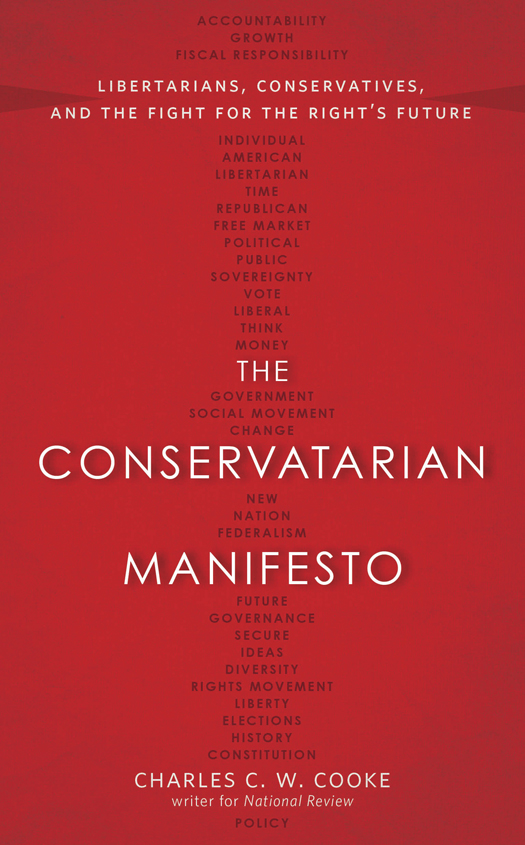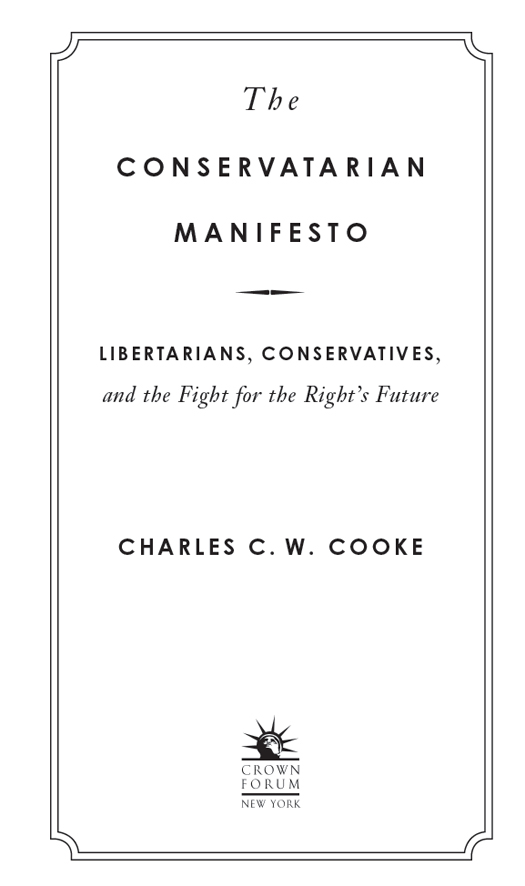Copyright 2015, 2016 by Charles C. W. Cooke
All rights reserved.
Published in the United States by Crown Forum, an imprint of the Crown Publishing Group, a division of Penguin Random House LLC, New York.
www.crownpublishing.com
CROWN FORUM with colophon is a registered trademark of Penguin Random House LLC.
Originally published in hardcover in the United States by Crown Forum, an imprint of the Crown Publishing Group, a division of Penguin Random House LLC, New York, in 2015.
Library of Congress Cataloging-in-Publication Data Cooke, Charles C. W.
The conservatarian manifesto : libertarians, conservatives, and the fight for the rights future / Charles C. W. Cooke.First edition.
pages cm
1. ConservatismUnited States. 2. LibertarianismUnited States. I. Title.
JC573.2.U6C666 2015
320.520973dc23
2014031658
ISBN 978-0-8041-3974-8
eBook ISBN 978-0-8041-3973-1
Cover design by Jessica Morphew
v3.1_r2
To my father, Phillip,
who is everything that I aspire to be
Contents
Introduction
O N my desk at National Review, there is a piece of cardboard that was mailed to me by a man who is no great admirer of my work. Conservatism SUCKS! it declares in erratically scrawled capital letters. Lets get really conservative and go back to preMagna Carta days!
This is a jab to which I have grown accustomed in the past few years, based as it is on a popular misapprehension as to what those of us on the Right actually believe. It is worth clearing up this error at the start. That in America the friends of liberty are called conservatives and the centralizing authoritarians are referred to as liberals is one of the great semantic jokes of history. In almost every other part of the world, rightward-leaning political movements seek primarily to conserve the long-established order, and in consequence compete not for meaningful ideological terrain but for stewardship and for stasis. Elections abroad tend to be narrow and meretricious affairs, in which minor reductions in the considerable power of the state take on great significance and philosophy is seen as a dirty, even dangerous, word.
In the United States, by happy contrast, conservatism is marked by its unorthodoxy and its radicalism. Conservatives are passionate and ambitious, and their concern is for neither the international norms nor the tribal precepts that have animated most of human history, but for the manifestation of eccentric ideas that have surfaced only recentlyamong them property rights; separation of powers; hard limits on the power of the state; staunch protections of the rights of conscience, assembly, speech, privacy, and self-protection; a preference for local governance over central planning; a free and dynamic market economy that permits rapid change and remarkable innovation; and, above all, a distrust of any government that would step in to answer questions that can be better resolved by civil society.
Insofar as conservatives look back into the past, they typically do so to reestablish their purchase on timeless truths about the nature of politics and of human beings and to reacquaint themselves with a subversive political framework thatalthough more than two centuries oldhas been the most effective steward of political progress and material improvement in human history. So accustomed have we in the West become to the blessings of ordered liberty that it can be tempting to believe that this is the natural order of things. Alas, it is not. Thomas Jefferson, the principal author of the Declaration of Independence, correctly observed that the natural progress of things is for liberty to yield, and government to gain ground, adding wisely that freedoms, once lost, are rarely regained. But he did not mention that enjoying liberty in the first instance is a rare privilege indeedone that has been accorded to only a handful of the billions of people who have come and gone from the Earth. If conservatism in America has one goal, it is to preserve that opportunity.
This countrys founding generation was preoccupied with designing a system that would prove difficult for evil and ambitious men to commandeernot because there was an uncommonly large number of such men here in the late eighteenth century, but because history had shown them to be a feature of every age and a threat to all peoples. For most of the countrys history, my colleague Kevin D. Williamson notes, politics has been the word used to describe the altercation between those laboring under the impression that our institutions could be channels of moral action and reliably ethical arbiters of such ill-defined standards as fairness and social justice, if only we put the right people in power, and those who believe that man is a fallen creature who cannot always be trusted to act rationally and magnanimously. This question, of the essential nature of man, is at the very root of the disagreement between the Left and the Rightthe Rights skepticism resting heavily upon the presumption that human beings do not change when they are accorded great power and that, if anything, we should be more and not less suspicious of anybody who seeks out influence; the Left taking the opposing view.
The Rights acknowledgment of the limitations of man and of the state that he has created is imperative. It is often asserted that free markets perform better than does central preparation, and that governments are unable to achieve by design what a free people may spontaneously. But it is rarely explained why this is the case. The answer is refreshingly simple: Because so much that the state does it is not designed to do well, however ingenious are the men and women we put in charge. Brilliant as our bureaucrats may be, they are simply incapable of running a country this size. As George Will discerned in 2014, the United States is not a parcel to be taken anywhere. It is the spontaneous order of 316 million people making billions of daily decisions, cooperatively contracting together, moving the country in gloriously unplanned directions. It does not matter whether we have a Harvard professor or a business mogul or a lifelong politico running the Department of Energy; none of them can do half as well for a local in Springfield, Virginia, as that local can do for himself. It does not matter how accomplished or credentialed the economists at the head of the Department of Commerce are; they will never grasp the details of the market better than the businesses they are seeking to aid. All too often, our politics is focused on a rotten capital city that sits on the Eastern Seaboard and not on our various institutions of meaning: the churches, charities, clubs, associations, sports teams, businesses, families, towns, cities, counties, and states that make up the whole. This vexes conservatives, at least ostensibly. But they might do more with their aggravation the next time they are in a position of power, steadfastly resisting the temptation merely to replace one set of tsars with another and choosing, this time, actually to let go.
There will be such a time. That the United States remains so keenly politically dividedand that its conservatives have not yet given upis a matter of great disappointment to social democrats and a source of considerable inspiration to me and to many millions of others. In the United States, questions that were long ago settled in Europe and beyond serve as matters of daily deliberation. Among those questions: What role should the government play in health care? Should the national government take a leading or a limited role in the national economy? Are individuals to be trusted with their own protection and allowed to possess the tools with which they might defend themselves?







